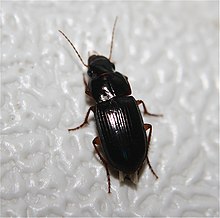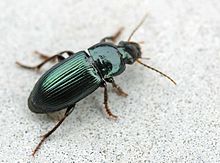Harpalinae
| Harpalinae | |
|---|---|
 | |
| Undetermined Harpalinae species | |
Scientific classification | |
| Kingdom: | Animalia |
| Phylum: | Arthropoda |
| Class: | Insecta |
| Order: | Coleoptera |
| Suborder: | Adephaga |
| Family: | Carabidae |
| Subfamily: | Harpalinae Bonelli, 1810 |
| Supertribes | |
| |
Harpalinae is a huge subfamily of ground beetles that contains 20,000 species[citation needed]. A rarely used common name for the subfamily is the harp beetles[citation needed]. The Harpalinae contain the most apomorphic ground beetles, displaying a wide range of forms and behaviors. Some are, rare among ground beetles, omnivores or even herbivores.
Many closely related subfamilies have been treated as subordinate taxa of the Harpalinae by various authors. Among these are the Dryptinae, Lebiinae (including Cyclosominae, Mormolycinae, Odacanthinae, Perigoninae), Licininae (including Chlaeniinae, Oodinae), Orthogoniinae, Panagaeinae, Platyninae, Pseudomorphinae, Pterostichinae (including Zabrinae). Here, they are considered independent families within the harpaline (sensu lato) assemblage, and this is also tentatively assumed for the enigmatic monotypic genus Ginema.
Systematics
At least 4 large and several smaller supertribes can be distinguished. The former "Pterostichitae" on the other hand seem to be, as presently delimited, a paraphyletic assemblage, but probably also contains a number of tribes closer to each other than to other Harpalinae. The clade around the type genus Pterostichus is thus recognized as subfamily Pterostichinae here.[1]
Genera
The Harpalinae include the following genera:[2][verification needed]

Harpalus affinis
Acinopus Dejean, 1821
Acupalpus Latreille, 1829
Afromizonus Basilewsky, 1947
Agonidus Casey, 1914
Allendia Noonan, 1974
Allocinopus Broun, 1903
Allosiopelus Ito, 1995
Amblygnathus Dejean, 1829
Amblystomus Erichson, 1837
Amerinus Casey, 1884
Amphasia Newman, 1836
Angionychus Klug, 1853
Anisocnemus Chaudoir, 1843
Anisodactylus Dejean, 1829
Anisostichus Emden, 1953
Anomostomus Laferte-Senectere, 1853
Anthracus Motschulsky, 1850
Athrostictus Bates, 1878
Axinotoma Dejean, 1829
Aztecarpalus Ball, 1970
Barysomus Dejean, 1829
Batoscelis Dejean, 1836
Bleusea Bedel, 1897
Boeomimetes Peringuey, 1896
Bottchrus Jedlicka, 1935
Bradybaenus Dejean, 1829
Bradycellus Erichson, 1837
Bradycidus Casey, 1914
Bronislavia Semenov, 1891
Carenochyrus Solsky, 1874
Carterus Dejean, 1830
Cenogmus Sloane, 1898
Chilotomus Chaudoir, 1842
Chydaeus Chaudoir, 1854
Coleolissus Bates, 1892
Crasodactylus Guerin-Meneville, 1847
Cratacanthus Dejean, 1829
Cratognathus Dejean, 1829
Cratosoma Jeannel, 1948
Criniventer van Emdem, 1953
Cyptomicrus Vinson, 1939
Daptus Fischer von Waldheim, 1823
Diachromus Erichson, 1837
Dicheirotrichus Jacqelin du Val, 1857 (including Trichocellus)
Dicheirus Mannerheim, 1843
Dioryche W.S. MacLeay, 1825
Discoderus LeConte, 1853
Ditomus Bonelli, 1810
Dixus Billberg, 1820
Dregus Motscheisky, 1864
Ectinothorax Alluaud, 1941
Egadyla Alluaud, 1916
Eocarterus Stichel, 1923
Eriophonus Tschitscherine, 1901
Eucarterus Reitter, 1900
Euryderus LeConte, 1846
Euthenarus Bates, 1874
Gaioxenus Broun 1910
Geodromus Dejean, 1829
Geopinus LeConte, 1848
Gnathaphanus W.S. MacLeay, 1825
Goniocellus Casey, 1914
Graniger Motschulsky, 1864
Gugheorites Basilewsky, 1951
Gynandromorphus Dejean, 1829
Hakaharpalus Larochelle & Lariviere, 2005
Haplaner Chaudoir, 1878
Haplanister Moore, 1996
Harpalinus Jeannel, 1946
Harpalobrachys Tschitscherine, 1899
Harpalodiodes Bousquet, 2002
Harpalomimetes Schauberger, 1933
Harpalomorphus Peringuey, 1896
Harpalus Latreille, 1802 (including Harpalobrachys)
Harpathaumas Basilewsky, 1947
Harponixus Basilewsky, 1950
Hartonymus Casey, 1914
Hemiaulax Bates, 1892
Heteracantha Brulle, 1834
Hippoloetis Laporte, 1835
Hyphaereon W.S. MacLeay, 1825
Hypharpax W.S. McLeay, 1825
Idiomelas Tschitscherine, 1900
Indiophonus N.Ito, 1996
Kaffovatus Clarke, 1972
Kenyacus Alluaud, 1917
Kiwiharpalus Larochelle & Lariviere, 2005
Kupeharpalus Larochelle & Lariviere, 2005
Lecanomerus Chaudoir, 1850
Liochirus Tschitscherine, 1897
Liodaptus Bates, 1889
Lioholus Tschitscherine, 1897
Loxoncus Schmidt-Gobel, 1846
Machozetus Chaudoir, 1850
Maoriharpalus Larochelle & Lariviere, 2005
Meroctenus Gemminger et Harold, 1868
Microderes Faldermann, 1836
Nemaglossa Solier, 1849
Neoaulacoryssus Noonan, 1985
Neodiachipteryx Noonan, 1985
Neohyparpalus Clarke, 1981
Neophygas Noonan, 1976
Nesarpalus Bedel, 1897
Nipponoharpalus Habu, 1973
Nornalupia Kataev, 2002
Nothodaptus Maindron, 1906
Notiobia Perty, 1830
Notospeophonus Moore, 1962
Odontocarus Solier, 1835
Oedesis Motschulsky, 1850
Oesyperus Andrewes, 1923
Omostropus Peringuey, 1896
Ooidius Chaudoir, 1847
Oosoma Nietner, 1857
Ophoniscus Bates, 1892
Ophonus Dejean, 1821
Orthogenium Chaudoir, 1835
Oxycentrus Chaudoir, 1854
Pachycarus Solier, 1835
Pachytrachelus Chaudoir, 1852
Panagrius Andrewes, 1933
Pangus Dejean, 1821
Parabaris Broun, 1881
Paramecus Dejean, 1829
Parasiopelus Basilewsky, 1950
Paregaploa Muller, 1947
Parophonus Ganglbauer, [1891]
Paulianoscirtus Basilewsky, 1976
Pelmatellus Bates, 1882
Penthophonus Reitter, 1900
Penthus Chaudoir, 1843
Phanagnathus Basilewsky, 1950
Phobophorus Motschulsky, 1850
Pholeodytes Britton, 1962
Phorticosomus Shaum, 1863
Phyrometus Basilewsky, 1946
Piosoma LeConte, 1848
Platymetopsis Ball et Maddison, 1987
Platymetopus Dejean, 1829
Pogonodaptus Horn, 1881
Polpochila Solier, 1849
Prakasha Andrewes, 1919
Proditomus Schauberger, 1934
Progonochaetus J. Muller, 1938
Pseudanisotarsus Noonan, 1973
Pseudaristus Reitter, 1900
Pseudodiachipteryx Burgeon, 1936
Pseudognathaphanus Schauberger, 1932
Pseudohyparpalus Basilewsky, 1946
Pseudorhysopus Kataev et Wrase, 2001
Pseudoselenophorus Peringuey, 1896
Psychristus Andrewes, 1930
Rhabidius Basilewsky, 1948
Rhysopus Andrewes, 1929
Scybalicus Schaum, 1862
Selenophorus Dejean, 1831
Selenotichnus Kataev, 1999
Siopelus Murray, 1859
Stenolophidius Jeannel, 1948
Stenolophus Dejean, 1821
Stenomorphus Dejean, 1831
Syllectus Bates, 1878
Trachysarus Reed, 1874
Trichopselaphus Chaudoir, 1843
Trichotichnus A.Morawitz, 1863
Trichoxycentrus N. Ito, 2000
Triplosarus Bates, 1874
Tropicoritus Alluaud, 1917
Tschitscherinellus Csiki, 1906
Tuiharpalus Larochelle & Lariviere, 2005
Typsiharpalus Tschitscherine, 1901
Uenanthracus Kasahara, 1994
Veradia Castelnau, 1867
Xenodochus Andrewes, 1941
Xenophonus Muller, 1942
Xestonotus LeConte, 1853
References
| Wikimedia Commons has media related to Harpalinae. |
Wikispecies has information related to Harpalinae |
.mw-parser-output .smallcapsfont-variant:small-caps
Carabidae of the World Database (CWD) (2008): Trees of family Carabidae. Retrieved 2008-JUL-24.
^ CWD (2008)
^ "Harpalinae Bonelli, 1810". Carabidae of the World. 2012. Retrieved 11 Nov 2012..mw-parser-output cite.citationfont-style:inherit.mw-parser-output qquotes:"""""""'""'".mw-parser-output code.cs1-codecolor:inherit;background:inherit;border:inherit;padding:inherit.mw-parser-output .cs1-lock-free abackground:url("//upload.wikimedia.org/wikipedia/commons/thumb/6/65/Lock-green.svg/9px-Lock-green.svg.png")no-repeat;background-position:right .1em center.mw-parser-output .cs1-lock-limited a,.mw-parser-output .cs1-lock-registration abackground:url("//upload.wikimedia.org/wikipedia/commons/thumb/d/d6/Lock-gray-alt-2.svg/9px-Lock-gray-alt-2.svg.png")no-repeat;background-position:right .1em center.mw-parser-output .cs1-lock-subscription abackground:url("//upload.wikimedia.org/wikipedia/commons/thumb/a/aa/Lock-red-alt-2.svg/9px-Lock-red-alt-2.svg.png")no-repeat;background-position:right .1em center.mw-parser-output .cs1-subscription,.mw-parser-output .cs1-registrationcolor:#555.mw-parser-output .cs1-subscription span,.mw-parser-output .cs1-registration spanborder-bottom:1px dotted;cursor:help.mw-parser-output .cs1-hidden-errordisplay:none;font-size:100%.mw-parser-output .cs1-visible-errorfont-size:100%.mw-parser-output .cs1-subscription,.mw-parser-output .cs1-registration,.mw-parser-output .cs1-formatfont-size:95%.mw-parser-output .cs1-kern-left,.mw-parser-output .cs1-kern-wl-leftpadding-left:0.2em.mw-parser-output .cs1-kern-right,.mw-parser-output .cs1-kern-wl-rightpadding-right:0.2em
